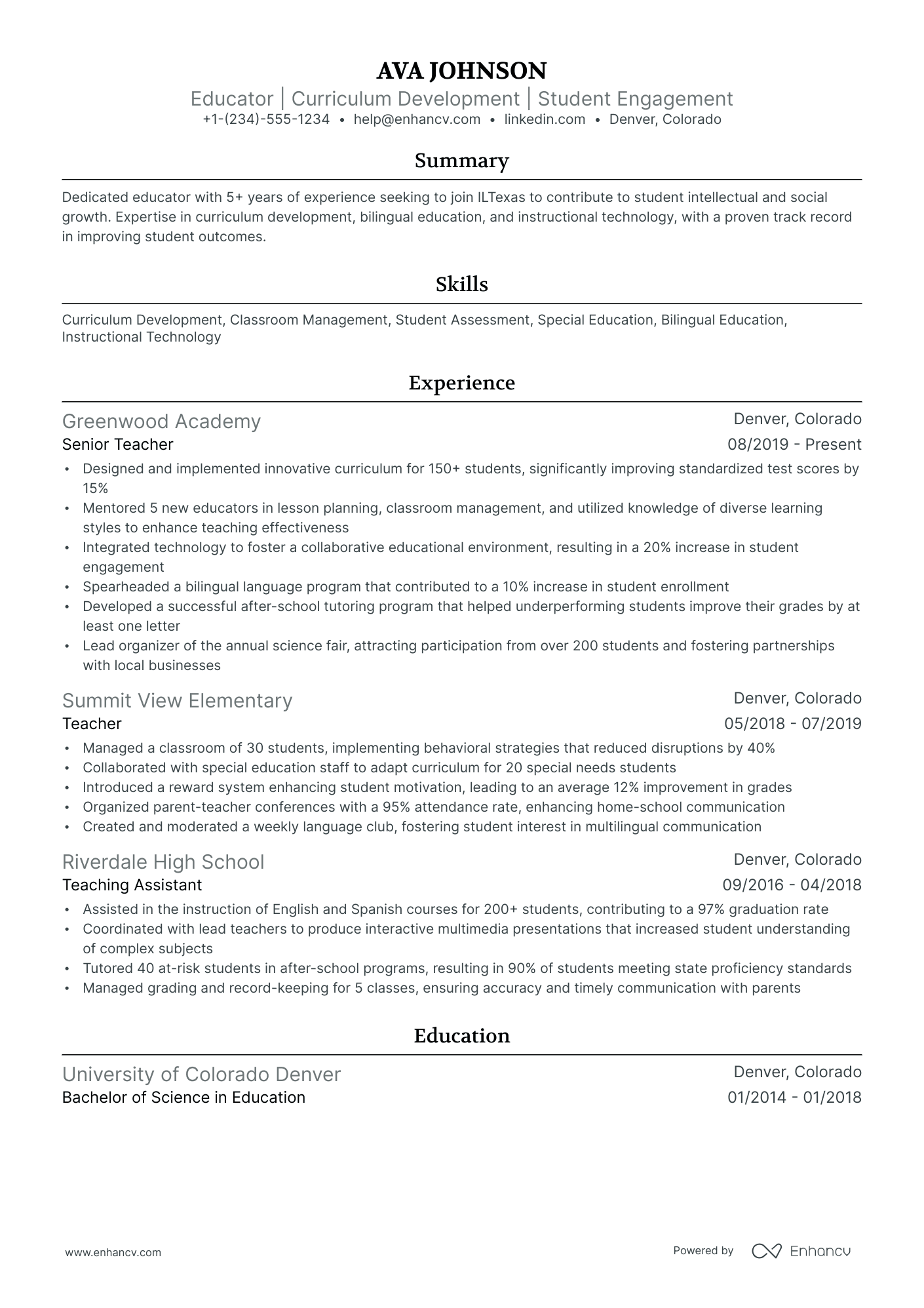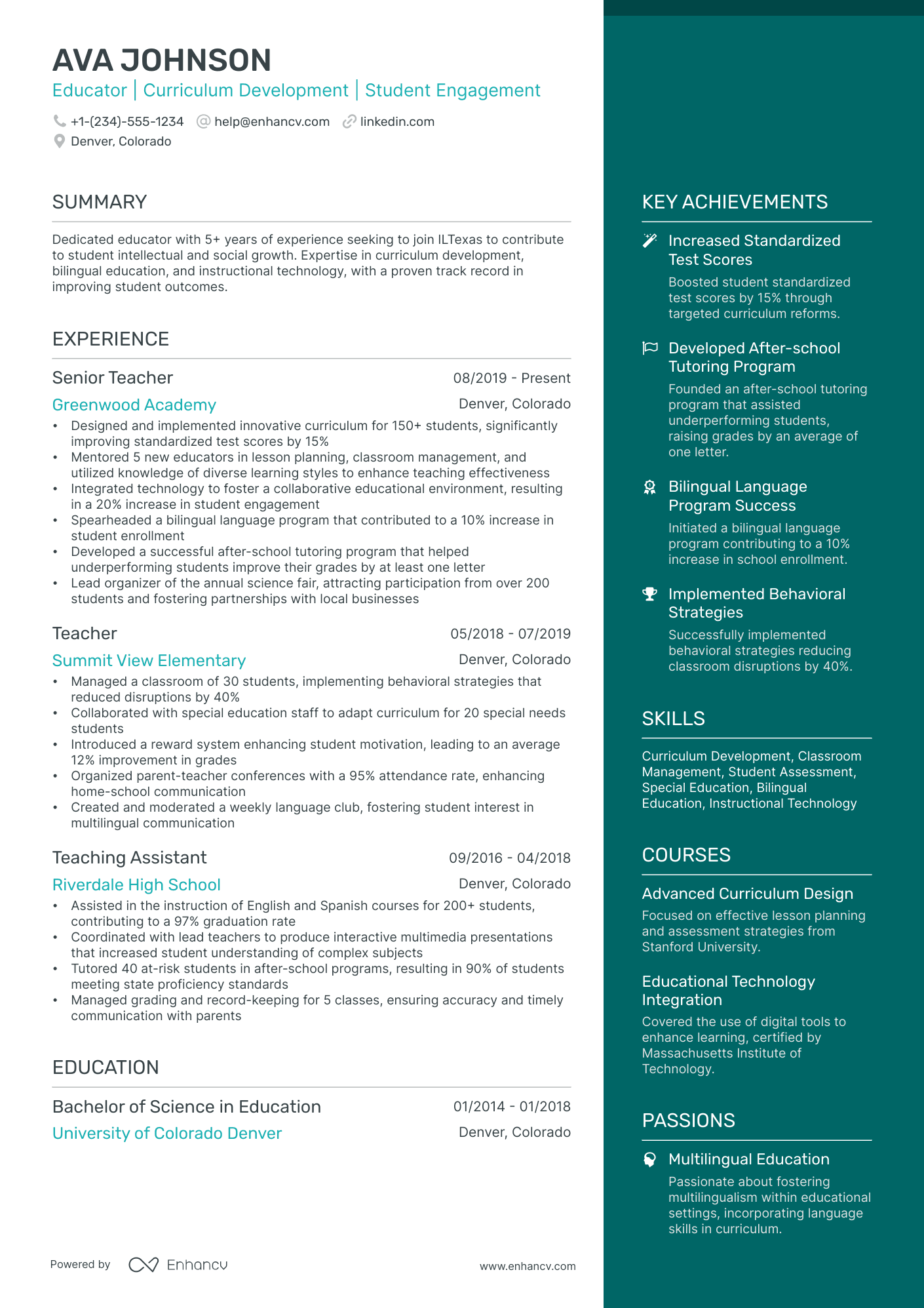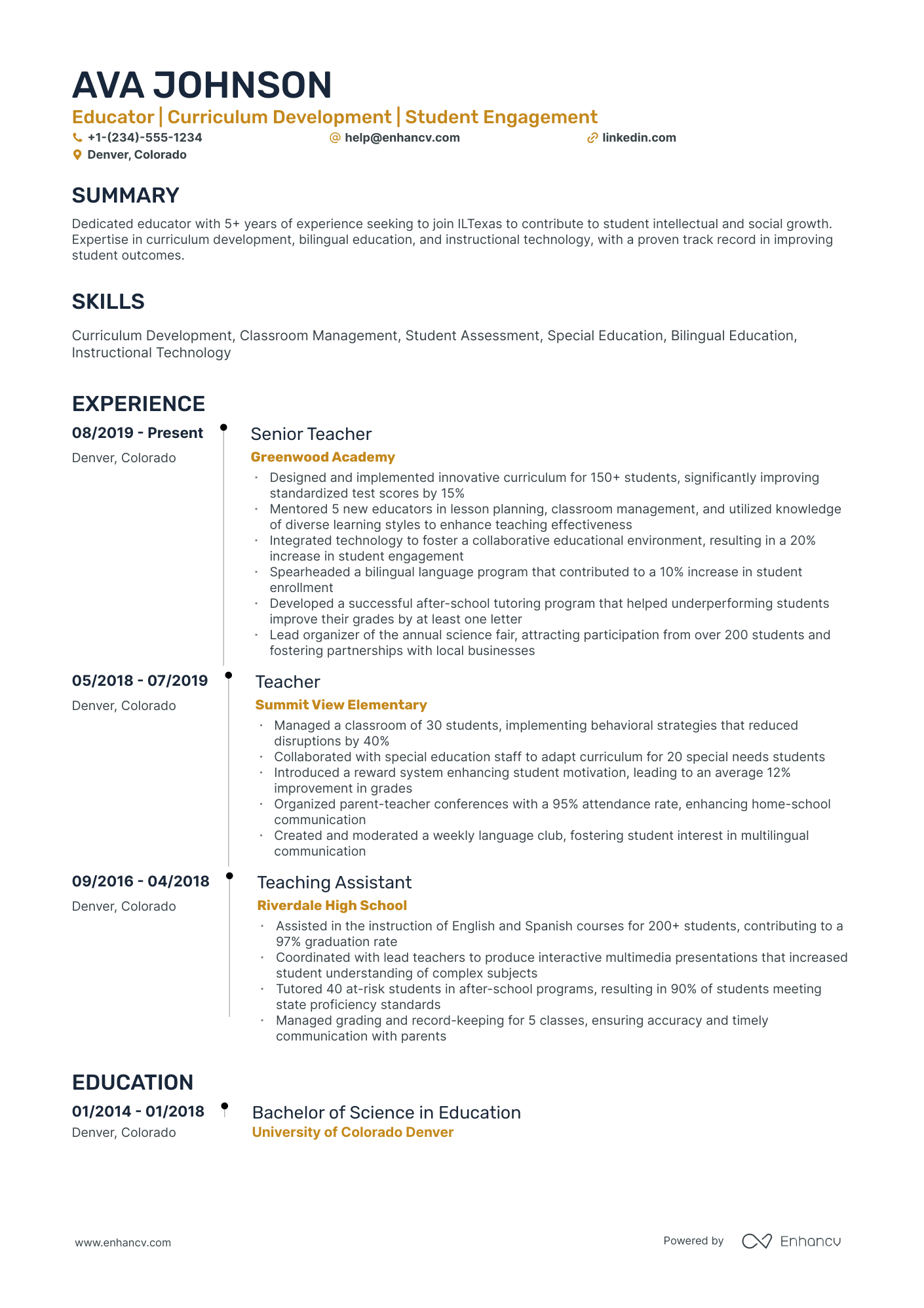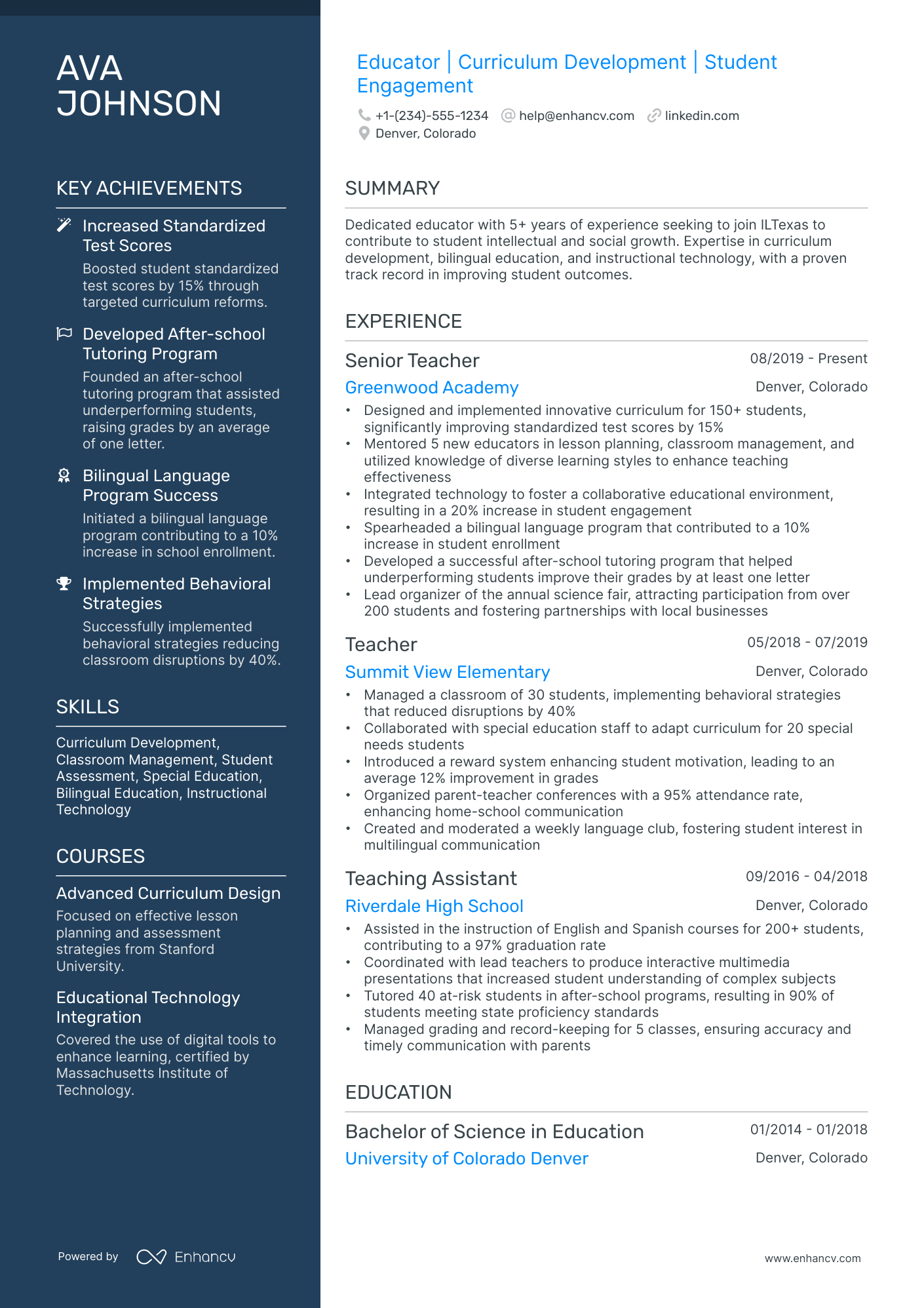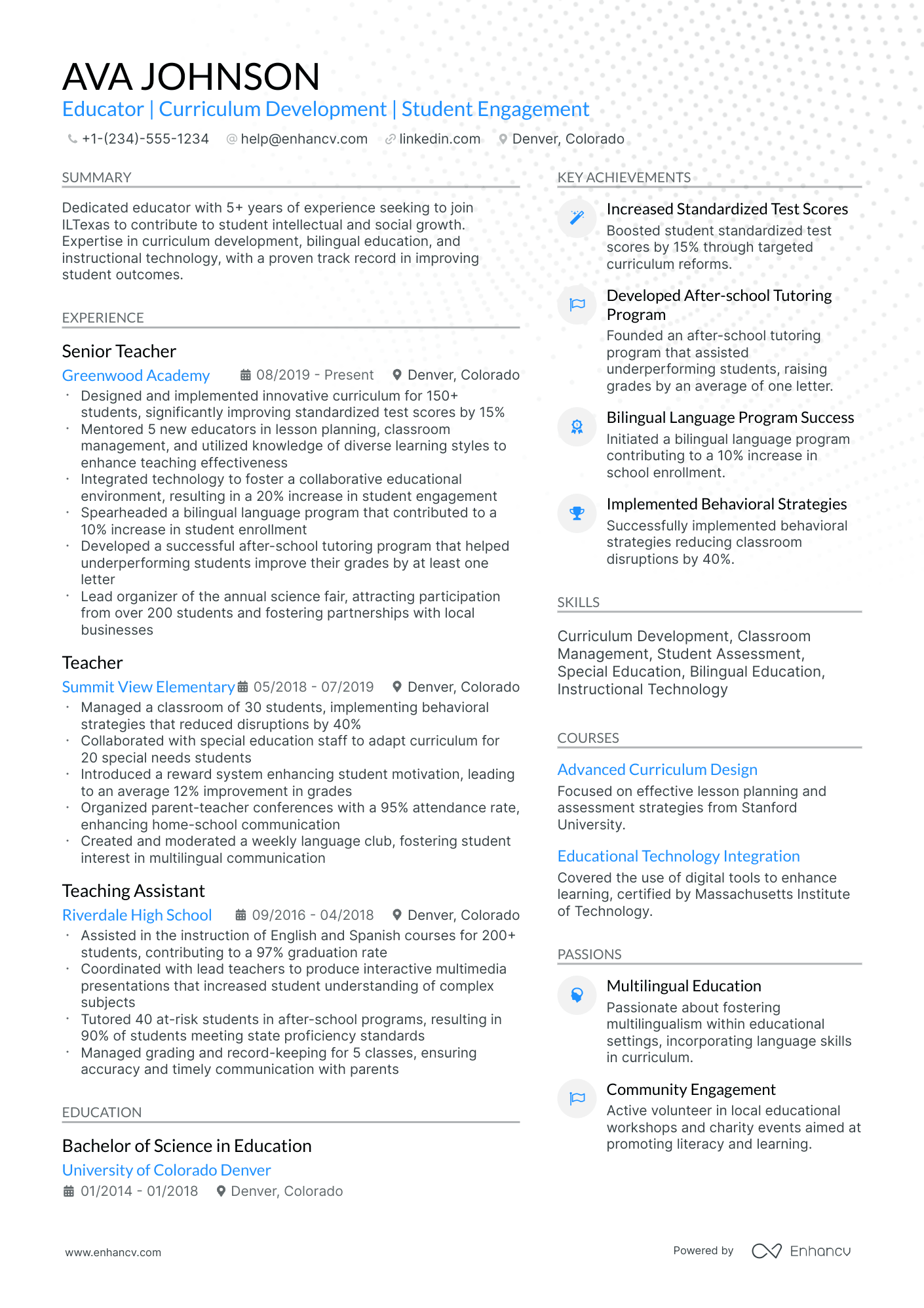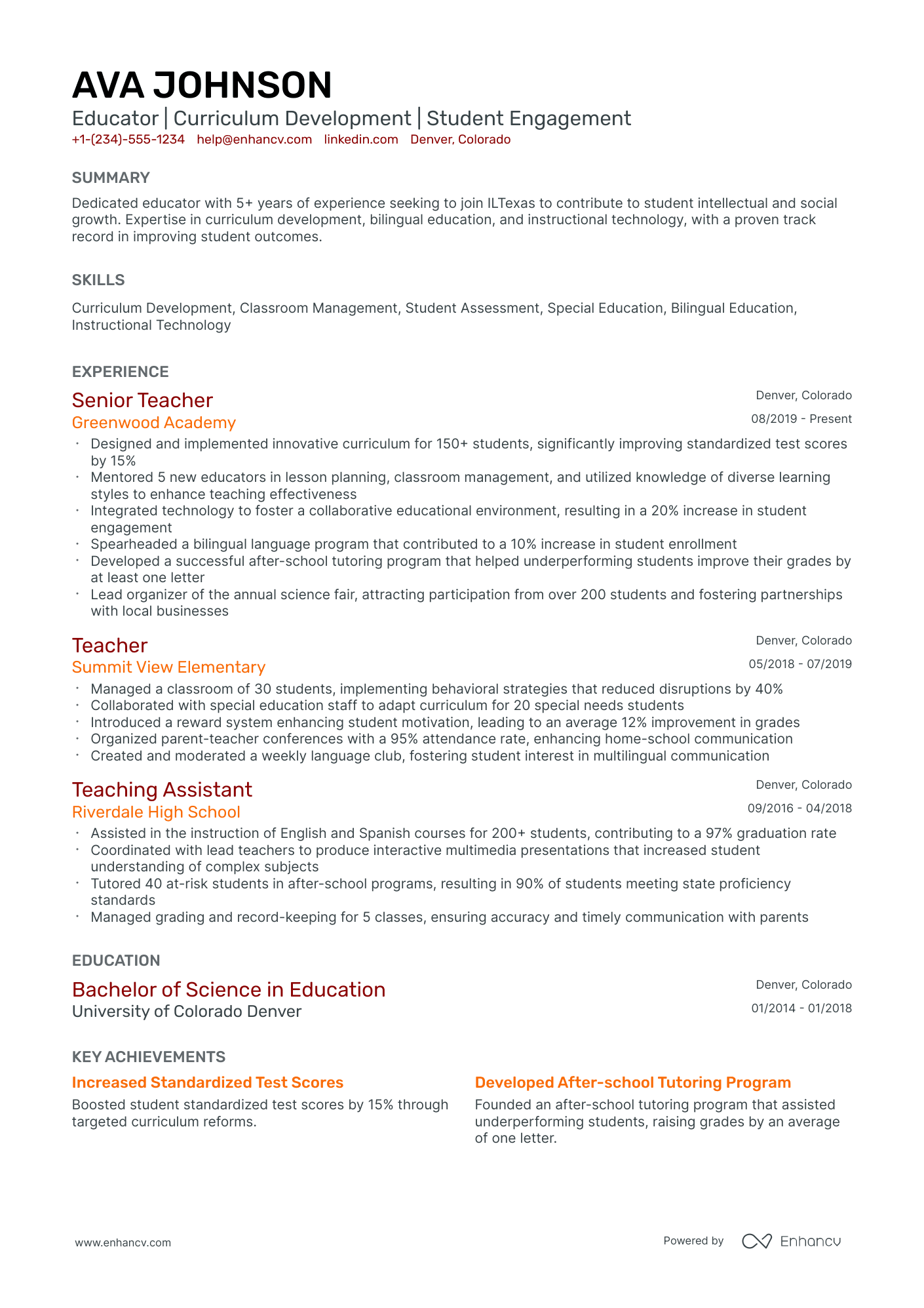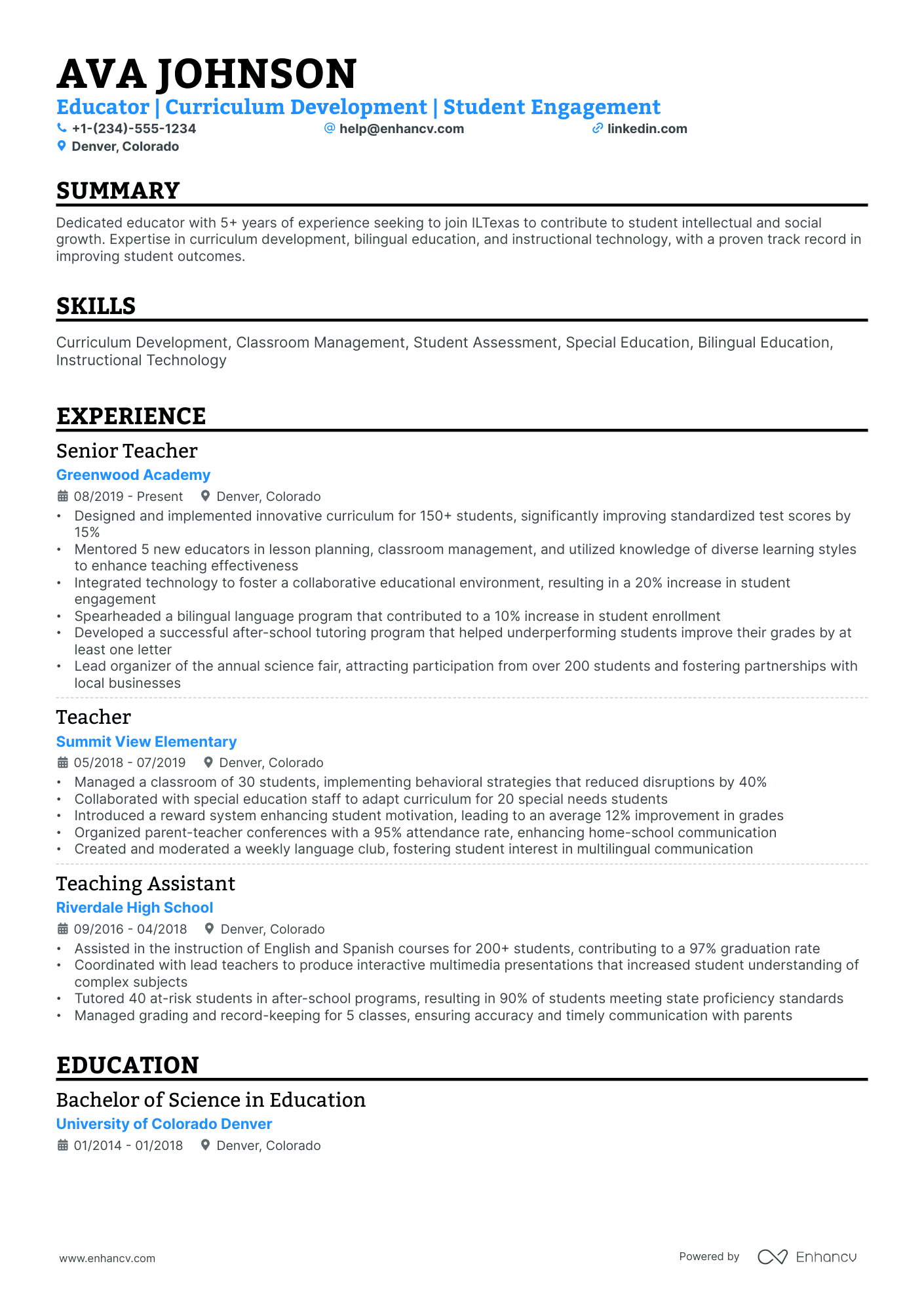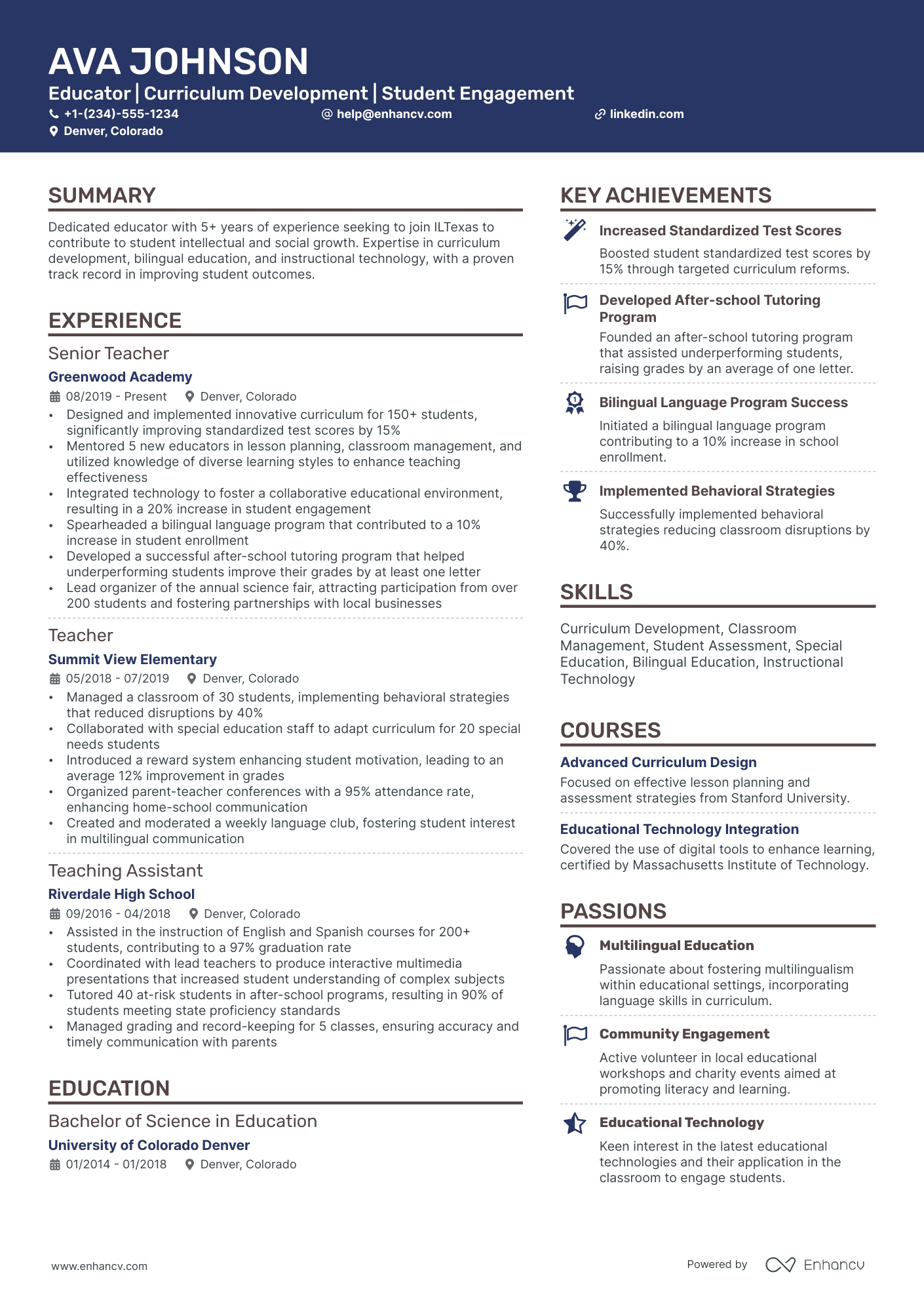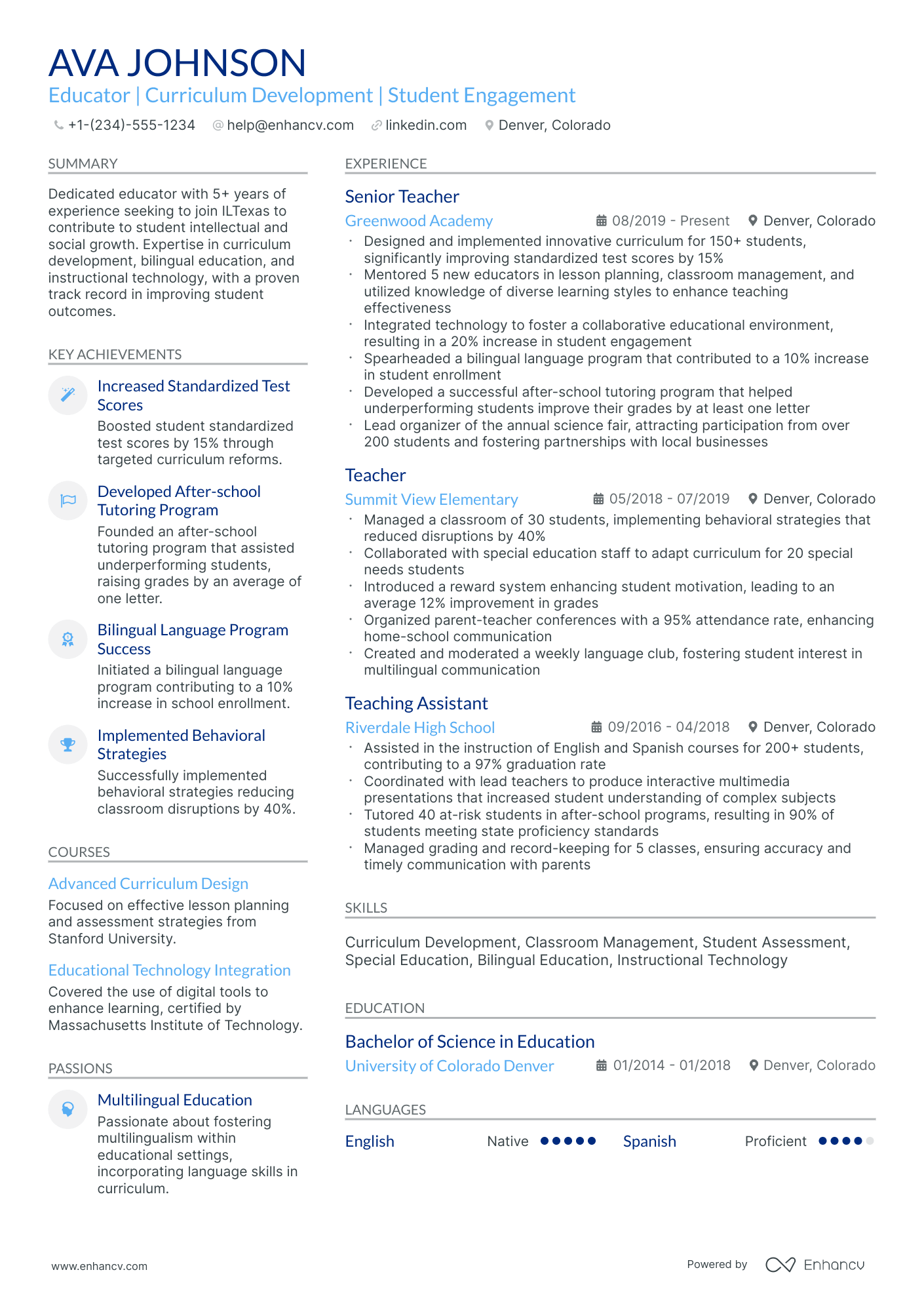As a theatre teacher, you may struggle with illustrating the breadth and impact of your diverse teaching and directorial experiences on a single-page resume. Our guide will equip you with strategies to succinctly showcase your dynamic skill set and help you create a compelling narrative that captures your unique contributions to the world of theatre education.
- Get inspired from our theatre teacher resume samples with industry-leading skills, certifications, and more.
- Show how you can impact the organization with your resume summary and experience.
- Introducing your unique theatre teacher expertise with a focus on tangible results and achievements.
If the theatre teacher resume isn't the right one for you, take a look at other related guides we have:
- Middle School Teacher Resume Example
- Biology Teacher Resume Example
- After School Teacher Resume Example
- Sunday School Teacher Resume Example
- Social Studies Teacher Resume Example
- Librarian Resume Example
- Coaching Resume Example
- Early Childhood Teacher Resume Example
- Kindergarten Teacher Resume Example
- Transitioning Teacher Resume Example
Theatre teacher resume format made simple
You don't need to go over the top when it comes to creativity in your theatre teacher resume format .
What recruiters care about more is the legibility of your theatre teacher resume, alongside the relevancy of your application to the role.
That's why we're presenting you with four simple steps that could help your professional presentation check all the right boxes:
- The reverse-chronological resume format is the one for you, if you happen to have plenty of relevant (and recent) professional experience you'd like to showcase. This format follows a pretty succinct logic and puts the focus on your experience.
- Keep your header simple with your contact details; a headline that details the role you're applying for or your current job; and a link to your portfolio.
- Ensure your resume reaches an up-to-two-page limit, only if you happen to be applying for a more senior role or you have over a decade of relevant experience.
- Save your theatre teacher resume as a PDF to retain its structure and presentation.
Adjust your resume layout based on the market – Canadian resumes, for example, may follow a unique format.
Upload & Check Your Resume
Drop your resume here or choose a file. PDF & DOCX only. Max 2MB file size.
PRO TIP
If you happen to have plenty of certificates, select the ones that are most applicable and sought-after across the industry. Organize them by relevance to the role you're applying for.
The key to your theatre teacher job-winning resume - present your expertise with these sections:
- A header to make your resume more scannable
- Snapshot of who you are as a professional with your resume soft skills, achievements, and summary or objective
- Job advert keywords in the skills section of your resume
- Resume experience quantifying your past job successes with metrics
- A relevant education, certification, and technical sills section to provide background to your technological/software capabilities
What recruiters want to see on your resume:
- Experience in directing and producing theatrical performances
- Proficiency in teaching a range of acting techniques and styles
- Ability to design and implement drama curricula that cater to different age groups and skill levels
- Strong background in stagecraft, including set design, lighting, and sound
- Proven track record of organizing workshops, rehearsals, and live performances, and fostering a collaborative and creative learning environment
Defining your professional expertise in your theatre teacher resume work experience section
The work experience section, often the most detailed part of your resume, is where you discuss your past roles and achievements. To effectively list your experience, consider these four key tips:
- Align your expertise with the job requirements. It's vital to integrate keywords matching the job criteria to pass initial assessments;
- Show, don’t just tell. Quantify your responsibilities by stating your actual achievements in previous roles;
- Include measurable metrics. For instance, how did your performance impact the annual ROI?
- Highlight crucial industry skills. Mention both technological knowledge and interpersonal skills in this section.
These guidelines will help you craft an impressive theatre teacher resume work experience section that is bound to catch recruiters' attention.
- Developed a comprehensive theatre arts curriculum that increased student enrollment in the program by 30% over two years.
- Directed and produced four major school plays and six smaller productions, improving school's cultural presence in the community.
- Implemented a peer review system that enhanced student performance and confidence, contributing to a 40% rise in students pursuing theatre at the college level.
- Orchestrated a yearly district-wide theatre festival, showcasing 20+ schools, which attracted over 5,000 attendees annually.
- Secured grants and funding totaling $50,000 for theatre education programs, enabling the purchase of new equipment and guest instructors.
- Collaborated with local theatres to create internship opportunities, resulting in 15 students gaining professional experience each year.
- Incorporated technology into the theatre curriculum by introducing digital set design software, increasing student engagement by 45%.
- Mentored students in writing and performing original plays, with two students winning state-level awards for their work.
- Initiated a summer theatre workshop program that grew to include over 100 participants within 3 years.
- Designed and facilitated professional development workshops for over 200 theatre educators, improving their teaching pedagogy.
- Authored a monthly newsletter circulated to 500+ educators with resources, lesson plans, and industry updates.
- Led a successful campaign to include theatre education credits in teacher certification requirements in the state.
- Overhauled the theatre program to include modern techniques and technologies, leading to a 50% rise in student satisfaction according to annual surveys.
- Established partnerships with local theatres to ensure students gain hands-on experience, resulting in an enhanced understanding of the professional theatre landscape.
- Hosted international theatre experts for masterclasses, which helped nurture a global perspective among the students.
- Integrated cutting-edge stagecraft technology into the curriculum, which increased the technical skillset of students by 60% over four years.
- Collaborated with local theatre productions to provide hands-on set design opportunities for students, securing 20+ real-world project experiences.
- Streamlined the set construction process for school plays, which reduced production costs by 25% while maintaining quality standards.
- Implemented an improv-based curriculum that boosted student's public speaking and creativity skills, as reflected in student evaluations and performances.
- Led the students to win first place at a national improv competition, showcasing their skills among peers from 50 schools.
- Formed a student-led improv troupe that performed monthly at community events, raising the school's profile and fostering practical performance experience.
- Pioneered a global theatre exchange program that connected students with international theatre groups, enhancing cross-cultural communication and techniques.
- Raised academic achievement by spearheading a mentorship program that linked underperforming students with theatre professionals, improving graduation rates by 35%.
- Oversaw the successful accreditation process for the school's theatre department, resulting in increased funding and program expansion.
Quantifying impact on your resume
- Include the number of productions you have directed or choreographed, showcasing your experience and production leadership.
- List the number of students you have instructed, indicating the scope of your teaching capabilities.
- Mention the percentage increase in audience attendance for shows you've worked on, reflecting your ability to draw in and engage crowds.
- Quantify fundraising efforts by stating the amount of money raised for theatre programs or events, demonstrating your contribution to financial aspects.
- Provide the number of theatre-related workshops or conferences you have conducted or attended, emphasizing your commitment to professional development.
- Detail the number of awards or recognitions your productions or students have received, underlining program excellence and personal achievement.
- State the number of theatre courses or curriculums you've developed, highlighting your creativity and instructional design skills.
- Indicate the percentage of past students who have pursued theatre-related careers or education after your tutelage, showing your lasting impact on students' futures.
Action verbs for your theatre teacher resume
Experience section for candidates with zero-to-none experience
While you may have less professional experience in the field, that doesn't mean you should leave this section of your resume empty or blank.
Consider these four strategies on how to substitute the lack of experience with:
- Volunteer roles - as part of the community, you've probably gained valuable people (and sometimes even technological capabilities) that could answer the job requirements
- Research projects - while in your university days, you may have been part of some cutting-edge project to benefit the field. Curate this within your experience section as a substitute for real-world experience
- Internships - while you may consider that that summer internship in New York was solely mandatory to your degree, make sure to include it as part of your experience, if it's relevant to the role
- Irrelevant previous jobs - instead of detailing the technologies you've learned, think about the transferable skills you've gained.
Recommended reads:
PRO TIP
If you're in the process of obtaining your certificate or degree, list the expected date you're supposed to graduate or be certified.
Shining a light on your theatre teacher hard skills and soft skills
To win recruiters over, you must really have a breadth of skill set presented and supported within your theatre teacher resume.
On hiring managers' checklists, you'd initially discover hard or technical skills. Those are the technology (and software) that help you perform on the job. Hard skills are easy to quantify via your education, certificates, and on-the-job success.
Another main criterion recruiters are always assessing your theatre teacher resume on is soft skills. That is your ability to communicate, adapt, and grow in new environments. Soft skills are a bit harder to measure, as they are gained both thanks to your personal and professional experience.
Showcase you have the ideal skill set for the role by:
- Dedicating both a skills box (for your technical capabilities) and an achievements or strengths section (to detail your personal skills).
- When listing your skills, be specific about your hard skills (name the precise technology you're able to use) and soft skills (aim to always demonstrate what the outcomes were).
- Avoid listing overused cliches in the skills section (e.g. Microsoft Office and Communication), unless they're otherwise specified as prominent for the role.
- Select up to ten skills which should be defined via various sections in your resume skills sidebar (e.g. a technical skills box, industry expertise box with sliders, strengths section with bullets).
Spice up your resume with leading technical and people skills, that'd help you get noticed by recruiters.
Top skills for your theatre teacher resume:
Script Analysis
Stage Direction
Set Design Software (e.g., SketchUp)
Lighting Design Tools
Sound Design Software (e.g., Pro Tools)
Costume Design Techniques
Theatrical Makeup Techniques
Performance Evaluation Tools
Theatrical Production Management Software
Acting Techniques
Communication
Collaboration
Creativity
Leadership
Empathy
Time Management
Conflict Resolution
Adaptability
Critical Thinking
Motivational Skills
PRO TIP
List all your relevant higher education degrees within your resume in reverse chronological order (starting with the latest). There are cases when your PhD in a particular field could help you stand apart from other candidates.
What are the best certificates to add to your theatre teacher resume + how to curate your education section
The education and certification resume sections are the underdogs of your theatre teacher resume.
They showcase to recruiters that you've invested plenty of time to gain valuable and specific know-how, vital for growth.
As far as the resume education section is concerned:
- Detail only advanced education, specifying the institution and timeframe.
- Indicate your forthcoming graduation date if you're in the midst of your studies.
- Consider omitting degrees that don't align with the job's requirements.
- Offer a description of your academic journey if it underscores your notable achievements.
When curating your degrees and certificates on your theatre teacher resume:
- Select only accreditation that matters to the role
- Niche knowledge that could help you stand out as a candidate (as is within the past few years), should be listed towards the top of your resume
- Include any pertinent data for credibility (e.g. institute name, graduation dates, etc.)
- Irrelevant degrees and certifications shouldn't make it on your resume. Those include your high school diploma and any specializations that have nothing to do with the technical or soft skills that are required for the job
As a final note, if you feel tempted to exclude your education or certification from your resume, don't.
These two sections could help you have a better competitive edge over other candidates - hinting that your professional journey in the industry may be for a longer period of time.
Recruiters find all of these theatre teacher credentials impressive:
The top 5 certifications for your theatre teacher resume:
- Professional Educator License in Drama/Theatre Education (PEL) - State Board of Education
- Certified Theatre Educator (CTE) - Educational Theatre Association
- National Board Certification in Drama (NBC-Drama) - National Board for Professional Teaching Standards
- Graduate Certificate in Theatre Education (GCTE) - Various Universities and Colleges
- Master of Arts in Teaching Theatre (MATT) - Various Universities
PRO TIP
The more trusted the organization you've attained your certificate (or degree) from, the more credible your skill set would be.
Recommended reads:
Writing the theatre teacher resume summary or objective: achievements, keywords, dreams, and more
Deciding on whether to include a resume summary or resume objective should entirely depend on your career situation.
If you have:
- Plenty of relevant achievements you'd like to bring recruiters' focus to, make use of the resume summary. Ensure each of your achievements is quantified with concrete proof (e.g. % of cases solved).
- Less applicable experience, utilize the resume objective. Within the objective include a few noteworthy, past successes, followed up by your professional dreams.
As a bonus, you could define in either your theatre teacher resume summary or objective what makes you the perfect candidate for the role.
Think about your unique hard and soft skills that would make your expertise even more important to the job.
These theatre teacher professionals have completely covered the formula for the ideal resume introduction:
Resume summaries for a theatre teacher job
- With over 15 years of experience directing and producing award-winning plays in both high school and community theater settings, this dynamic educator possesses a Master's in Theater Arts and a proven track record of mentoring and developing aspiring actors, with students going on to notable performing arts colleges.
- Bringing 10 years of experience as a professional actor on Broadway, this candidate offers a unique perspective to the academic world, eager to transition skills into empowering the next generation of performers through innovative educational methods, emphasizing practical stage experience and a solid foundation in theater history.
- After 8 years of leading successful digital marketing campaigns that increased brand awareness and engagement for high-profile entertainment clients, this individual seeks to pivot their expertise into cultivating the theatrical talents of students, bringing a keen understanding of audience captivation and multimedia storytelling techniques into a scholastic environment.
- Accomplished visual arts teacher with over a decade of experience in fostering creativity and critical thinking, aims to apply transferable skills like design, presentation, and collaboration in theater education, backed by a commitment to inspiring students to explore and express their passions through dramatic arts.
- Aspiring to spearhead youth theater programs, I am passionately driven to blend my fresh Bachelor of Arts in Drama with my three years of extracurricular drama facilitation, despite a lack of professional teaching experience, to create inclusive and engaging curriculums that ignite lifelong appreciation for the performing arts.
- Determined to leverage a lifelong participation in community theater and a Bachelor's in Theater Studies, I am enthusiastic about bringing my fresh perspective and contemporary understanding of theater dynamics to inspire a new generation of students, even in the absence of formal teaching experience.
Recruiters' favorite additional theatre teacher resume sections
When writing your theatre teacher resume, you may be thinking to yourself, " Is there anything more I can add on to stand out? ".
Include any of the below four sections you deem relevant, to ensure your theatre teacher resume further builds up your professional and personal profile:
Key takeaways
- Impactful theatre teacher resumes have an easy-to-read format that tells your career narrative with highlights;
- Select a resume summary or objective, depending on what sort of impression you'd like to leave and if your accomplishments are relevant to the job;
- If you don't happen to have much industry expertise, curate additional gigs you've had, like contracts and internships, to answer how your experience aligns with the theatre teacher job;
- Be specific about the hard and soft skills you list on your resume to define your niche expertise and outcomes of using those particular skills;
- Always tailor your resume for each theatre teacher application to ensure you meet all job requirements.
